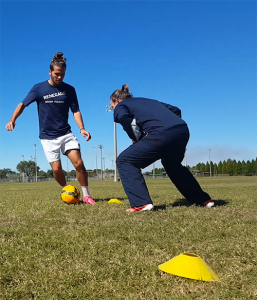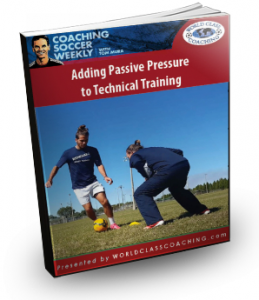Podcast: Play in new window | Download
Subscribe: Apple Podcasts | RSS
 Last week was our final weekend of league play which came just in time because the weather is due to get much colder this weekend.
Last week was our final weekend of league play which came just in time because the weather is due to get much colder this weekend.
Since I don’t have any games this weekend I scheduled my recertification courses for outdoor and Futsal refereeing. It’s always interesting going into a room of referees as a local coach. There’s an adversarial relationship between these two groups that can’t be avoided. I think I’m pretty quiet when it comes to dealing with the referees that officiate my games but there just seems to be an unavoidable tension between coaches and referees.
On Sunday I’m working with some young referees through our league’s Referee Mentoring Program. I enjoy this role because it’s so closely related to what I do as a coach except that I get to help young people learn to be better, more confident referees instead of players.

This week’s question comes from Chris. He asks about how to deal with disruptive players.
Chris says,
“This current fall season, I’ve been coaching with a different league and have had a lot of issues with players being disruptive, not listening, not following directions and not focusing. Part of it may be the age group, 10 – 13 year old kids, but I’ve coached that age group several times in the past. Part of it may be that every team has a portion of the same pitch to practice on. I’ve never shared a field with more than one other team before. This season, we have 6 teams practicing on one pitch. I’ve already given the players, and parents, my expectations and goals for the season. I have had disruptive players run laps, but they seem to keep on talking and not focusing regardless.
I want to strike a balance between player participation, enjoyment and creativity while directing the practice and getting specific things accomplished.
How do you deal with disruptive players and help them to go from being a distraction, to an asset? How do you get them to focus instead of acting like it is recess at school? Additionally, how do you develop a player’s internal motivation so that the players want to win and are willing to work for it?”
Thanks for the question Chris!
I looked at these challenges when answering a listener question back in Episode 107.
I think it’s more of an art than a science. Each group is different and what may work for one disruptive player will not work for another. In general, I remove disruptive players from activities rather than making them run. I find that this is more effective than laps. If someone is being a particular distraction then I let them know that they will miss the game at the end of training if they continue. That’s the part of the practice that most players look forward to most. If a player has to sit out of scrimmage at the end of training they’re usually much quicker to quiet down and listen in the future. Just be sure you follow through if you give this ultimatum.
Making activities fun, engaging and challenging without them being too difficult for the players skill level is the best way I’ve found to motivate players to give their maximum effort. If something is too easy then it’s not engaging. If it’s too hard to gain success then players will protect themselves by not giving it their best rather than really try and fail repeatedly.
In This Episode
Today I share some ideas on how you can incorporate the use of passive pressure into your technical training activities to help your players learn the timing and awareness they need to apply their skills in the game.
Here are links to the SuperCoach app, Facebook and Instagram accounts that I mention in this episode.
Printable Show Notes
The show notes for each episode are accessed through the WCC Training Center.
They are FREE but you will need at least a Free Membership to the Training Center in order to view and print them. They’ll be available there for eight weeks before they’re placed in our archive which can be accessed at any time by Elite Members.
Click on the image of the notes and if you’re already logged in to the Training Center you’ll be taken to the Podcast page. If you’re not logged in your be taken to a login page where you’ll also be able to login or register if you are not already a Member.
Remember!
Make sure you subscribe to Coaching Soccer Weekly through iTunes, or your podcast provider of choice, to be sure you never miss an episode.
We would appreciate it if you would leave us a 5 star rating and/or a written review on iTunes to help spread the word about the show and ensure that we can continue to bring you top notch guests in the future.
Future Episodes
Next week I’m going to look at how training the mindset of a player can be the most important thing you do as a soccer coach.


Leave a Reply